The fastest browser for weak PCs. Which browser is better for weak computers - modern Mozilla Firefox or a project based on its old Pale Moon engine
Subscribe:

Long page loading times always irritate users, who subsequently begin to suffer from Internet speed problems. Although the reason may be a weak computer on which a heavy browser with many extensions is installed. Install the Pale Moon browser and reduce page loading time by a quarter.
The Pale Moon browser works quickly on weak computers
Initially, the popular Mozilla browser was developed for the Linux platform and later edited for use in the Windows environment. In this regard, many users claim that it can slow down and take a long time to open pages. Enthusiasts approached this issue with complete seriousness and decided to develop a completely new Pale Moon browser for Windows OS users (there are also distributions for Linux OS), developed based on Firefox, the source code of which is publicly available.
“Pale Moon” is distributed absolutely free of charge and without built-in extensions. The lack of extensions has a positive effect on the speed of the browser, but creates certain difficulties for the user: for example, in order to watch any video using this program, you must install Flash Player yourself.
The original version of the Pale Moon distribution does not provide installation in Russian and the entire interface is in English. Although, using the downloaded archive and language modules of the program, you can perform Russification.
To summarize, we can note both the positive aspects of Pale Moon and the negative ones.
The positive aspects include:
- Free to use.
- A significant increase in the speed of opening pages (this is especially noticeable on low-power computers).
- Open source code (allows programmers to independently make modifications for themselves).
- If you have an account in Firefox, all bookmarks and saved passwords can be transferred to this program for viewing web pages.
The negative aspects include:
- Lack of Russian-language interface in the official version.
- Plugins that 99% of 100% are needed by the user to one degree or another (for example, Flash Player) are not installed.
- Many complain about the rather complex architecture and difficulties in personal settings.
The user’s decision to use “Pale Moon” must be made independently, taking into account all the listed capabilities and disadvantages.

Modern smartphones are becoming more and more versatile devices, today capable of not only receiving and receiving calls, watching videos and navigating, but also have good built-in cameras that can be used for...

Any operating system for desktop and mobile devices periodically needs updates. This is due to the fact that some viruses are being improved, new ones are being written, and besides, after the release of a stable platform, developers are trying to modify it...

Today, the number of active users of social networks is growing steadily. People like not only to communicate with their friends, but also to watch interesting videos and listen to their favorite music. Users of the VKontakte network will be glad to learn about the existence of a special...

The feature-rich product presented here is much closer to Microsoft solutions than similar editing software on smartphones. Most often, the concept of a text editor in Android means a very simple program that can...
 Hello everyone It seemed to me that I was well versed in hardware and software. Well, maybe it’s not that great, but it’s enough to advise you on how to solve this or that problem related to software or hardware. So. But if six months ago someone asked me what the fastest browser in the world is, I would have answered Mozilla. And I would be right, because if you don’t delve into the topic of browsers, then it seems like Mozilla is the one that loads a website page the fastest.
Hello everyone It seemed to me that I was well versed in hardware and software. Well, maybe it’s not that great, but it’s enough to advise you on how to solve this or that problem related to software or hardware. So. But if six months ago someone asked me what the fastest browser in the world is, I would have answered Mozilla. And I would be right, because if you don’t delve into the topic of browsers, then it seems like Mozilla is the one that loads a website page the fastest.
But I was wrong... And it all happened when I bought a board with a soldered Atom 330 processor on the cheap - small and remote. It has two cores, but there is Hyper-threading technology, that is, there are threads, resulting in 4 threads, and in Windows this is shown as 4 cores. Well, I thought, this is great, but I was a little upset when I realized that the performance was certainly not enough. Well, what should you expect from a mobile processor?
So. I started thinking about how I could make the pages load faster in the browser. And then I installed Mozilla, but alas, it was too heavy for the Atom processor. Well then I installed Chrome. And fortunately there was enough memory (4 gigs), then Chrome worked somehow. I loaded even heavy sites, even if I had to wait a little. But I thought again, is it possible to find some kind of browser that will be like a rocket. And you won't believe it, I found it, it's called Pale Moon!
Pale Moon is a browser developed on the basis of Mozilla, which is somehow very cleverly optimized for both conventional processors and Atoms. I installed it and I was shocked - many pages actually loaded much faster, the interface is nice, it doesn’t load anything and it eats up a little RAM.
There is a version for both 32-bit Windows and 64. Both XP and Windows 10 are supported. You can download from the official website, or write in the Pale Moon search engine and the official website should be in the first position:

There you download the version for your Windows. It installs without any glitches, during installation it is not suggested to install either Yandex-soft or Mail-soft, this is already good
When you first launch it, you will be prompted to import settings from some other browser:

The last point here is to give up imports.
Also during installation you will be asked to leave the Pale Moon home page or import it from the Internet Explorer browser:

Well, that’s all, then the browser will install and you can try what kind of Pale Moon browser it is. It seems to be translated as Pale Moon.. But I could be wrong
So, after launching the browser, you will have an unpleasant jamb. Well, maybe it doesn’t matter to some, but there is no Russian language in the browser. But don’t worry, I’ll show you how to implement it there!
This is what Pale Moon looks like:

As you can see, in a word, it looks good and comfortable
Let me tell you right away that all these unnecessary buttons, the search bar (well, the one on the side of the address bar), all these bookmarks - all this can be removed and you can customize the browser for yourself.
Now about the Russian language. Let's go to this site:
palemoon.org/langpacks.shtml
Then down there we look for something like ru.xpi - this is the Russian language for the browser, look, here it is:

Click on ru.xpi and there will be a window like this, then click Install Now:

Then you should see the following message, saying that the language is installed normally and there are no jambs:

Almost everything, now all that remains is to activate the Russian language. See how to do it, first go to this address:
In the next message, click the I promise to be careful button:

Now look what you are doing, paste this:
general.useragent.locale
In the Search field and press enter:
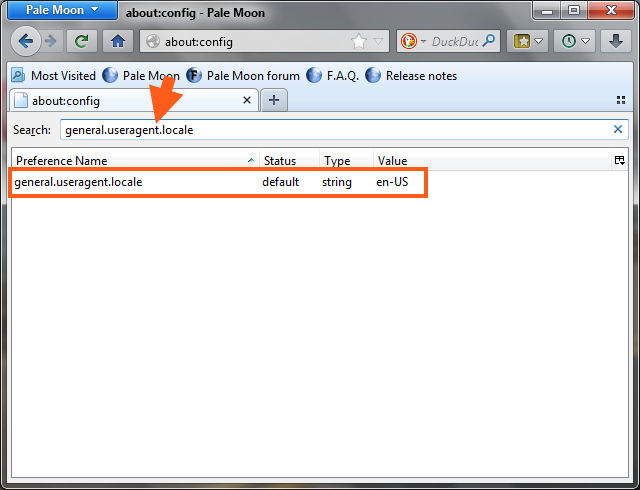
There you should see the line general.useragent.locale, this line is a parameter that specifies the browser language. Here it now says en-US, but we need to change it to Russian! To do this, double-click on this line, the following window will appear:

And here you change en-US to ru-RU so that it becomes like this:

Click OK in this window and that’s it, now you can press F5 for the test, if it says that there are dragons here, then you did everything correctly:
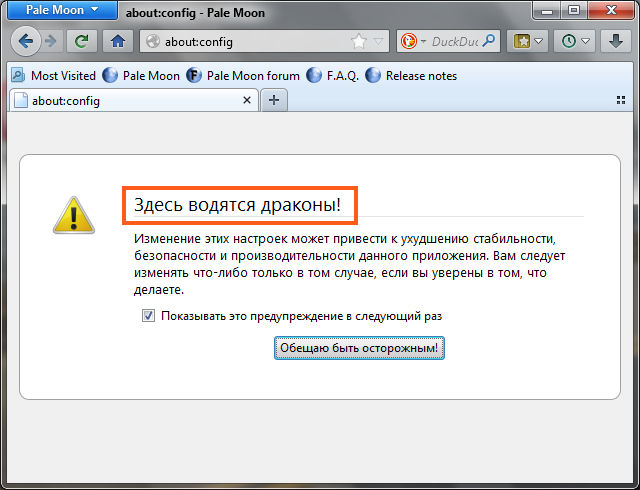
Now, for the browser to be completely in Russian, you need to close it and start it, that is, restart it
Well, that’s it, so I opened the menu and everything is in Russian:

So there is nothing complicated here. Well, without leaving the checkout, I will also show you how to install a Russian spelling dictionary in Pale Moon!
To be honest, I either don’t remember or there is simply no setting where you can add a dictionary. Therefore, I propose to do this: open any page where there is a text field, for example, I opened the Yandex search engine. And right-click on the text field and check the Spell Check box:
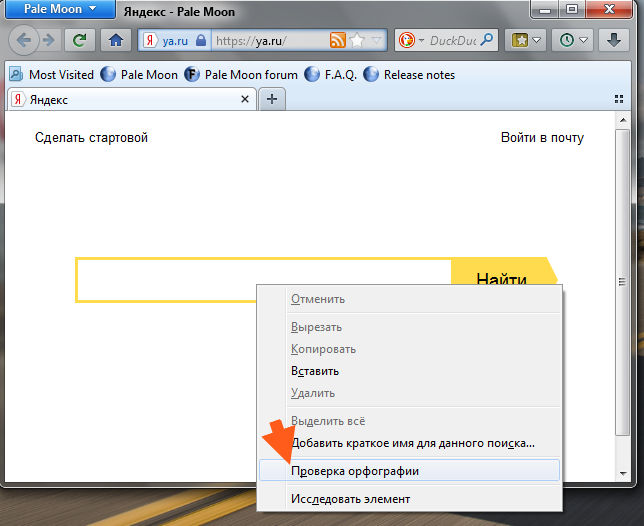
After that, right-click again and there will already be a Languages menu, and inside it the Add dictionaries item:

Then a tab will open, by the way Mozilla, and there you need to find Russian and click on Install dictionary. I immediately advise you to hold down Ctrl + F and enter Russian into the search, so you will find it faster:
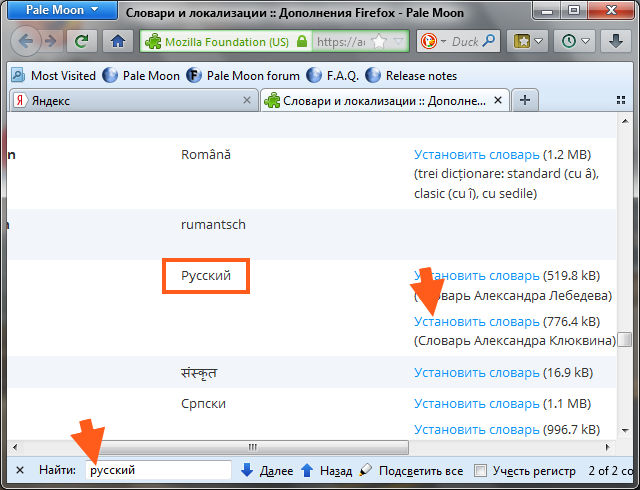
I advise you to install the larger dictionary. Well, there are probably more words, which means a better check, well, in general, I chose the one with more...
Then you will need to click on Add to Firefox:
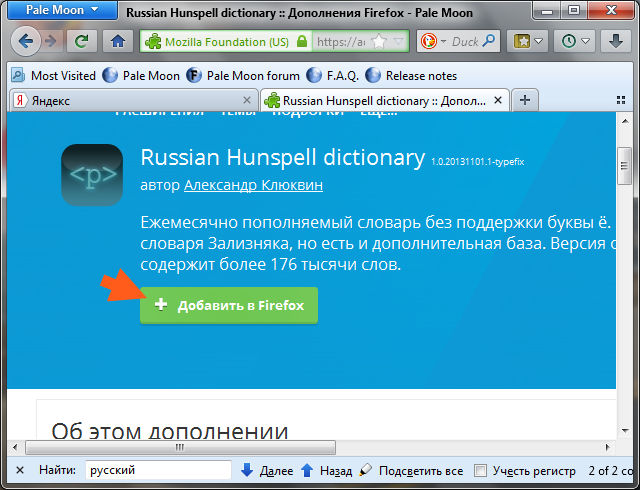

And then there will be a message saying there are no jambs, everything is installed fine:

After this, you will need to check the Spell Check box again, and then Russian will be selected automatically:

Well, you see how it all turned out. I wanted to tell you about Pale Moon, but in the end I told you how to put the Russian language into it and how to add a Russian dictionary for spell checking. Well, how could it be otherwise, this is the first thing you need to do to make the browser more or less comfortable to use.
By the way, here’s the settings window (you can get to it by clicking on the Pale Moon menu button in the upper left corner and selecting the item there):
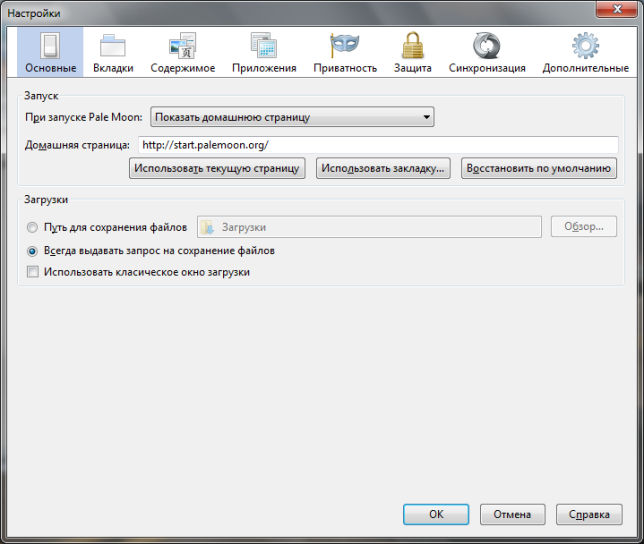
That is, you see it as if it were Mozilla, but not quite modern. That's right. Pale Moon is not made on the latest version, but, so to speak, on the one that is still modern. In general, it supports everything, YouTube and all sites, flash and video, in general, everything works there. It’s just that the version of Mozilla, as a base, is not the most recent, but simply fresh.
I don’t know whether you will like this browser or not, but in general I don’t see any strong reasons why you might NOT like it. Here are the advantages I see in it:

Well, it looks like I wrote everything I had to! I strongly advise you to try this browser and understand that I’m not making it up, it’s really very fast and even somewhat reminiscent of Opera 12. And this, well, I’ve never seen such a browser, for me, this is the best that can be from browsers Today.
Due to my duty, I have to maintain several computers of very respectable age in working condition. In terms of hardware, this is not difficult - fortunately, cars produced 10 years ago are often assembled (soldered) to a higher quality than modern consumer goods. But in terms of software, the task is more difficult. The biggest headache for me is antiviruses and browsers. Both of them are very hungry for RAM, which, alas, is in short supply (for the last 1.5 years, the budget for upgrading computers at school has been approaching zero, and a small upgrade can only be done if the old hardware completely fails). Meanwhile, it is highly advisable to update both the antivirus and the browser periodically. We'll talk about choosing an antivirus some other time, but today I'll try to find the fastest browser for old computers.
First, a little background. Until recently, I installed the old Opera 12 on all old computers. But, alas, one fine day, this once wonderful browser began to display crookedly a vital site - an electronic magazine. Well, I had to say goodbye to the old Opera and look for alternatives.
First of all, of course, I checked how the fresh Opera would behave on old machines. Alas, as expected, Opera 30 (this version was current at the time of my experiment) behaved like a typical Chromium browser: it consumed a lot of memory, forcing the computer to swap heavily (IDE disk, heh...). Things were a little better with other standard chrome clones (Yandex.Browser, Chrome itself). The latest Firefox 40 behaves relatively well, but it has obvious problems with interface rendering (it slows down) and memory consumption is still quite high (especially when opening 2-3 tabs). Well, since the browsers known to everyone cannot cope with the task, let’s try different exotic ones.
Part 1. Looking for a fast browser in the Chromium camp
I was pleasantly surprised in terms of speed. Being an add-on to Internet Explorer, it works very quickly and does not eat up too much memory. But, alas, all this happiness is available only on Windows 7, and my weakest machines run Windows XP. No, the mentioned SlimBrowser works great under Windows XP, but the IE8 engine, alas, is hopelessly outdated and is not much different in rendering quality from the same Opera 12-.
Next, I decided to try out “unusual” variations on the Chromium theme. There were as many as three candidates. The first one is . It is positioned by the developers as a light and fast browser. In general, this statement is true - for a chromo clone, Midori is really quite light and fast. But, unfortunately, on computers with 1 gigabyte of RAM (and even more so with 512 megabytes) it is not light enough.
The second candidate is Chinese. The younger brother of the well-known Maxthon was born about a year ago. In essence, it is Chromium stripped to the limit. It really works quite quickly, but it still consumes a lot of memory. I would recommend it rather as an addition to the main browser on normal machines (when you need to quickly read something without waiting for the main browser to load - Nitro loads almost instantly). But this browser is not suitable for older computers.
Finally, the last Chrome in my experiment is the OpenSource project. The developer positions it as the successor to the good old Opera, but on a modern engine (guess which one?). True, from a technical point of view, this browser is built a little differently - it does not create a separate process for each sneeze. This feature allows Otter (and this is how the name of the browser is translated from English) to save memory quite well. In terms of speed and functionality, Otter is also doing pretty well. But, alas, it is still very crude and not stable enough for everyday use. And the interface, to be honest, leaves much to be desired... Besides, Otter is essentially a one-man show (in the sense of a developer) and, alas, there is almost no hope for quickly bringing the project to a digestible state.
Otter Browser. In the depths of the tundra Otter in spats...
Part 2. Looking for a fast browser in the Gecko camp
Well, since the Chrome community can’t please us with anything in terms of speed, let’s try to turn to the second opposing side and look at browsers based on the Gecko engine. This engine is no less popular among developers, although it has its own specifics. While browsers based on Chromium (and Blink) are mainly built by various commercial companies (Otter is a rare exception), Gecko is more popular among the OpenSource community. Unfortunately, this community, for the most part, is busy changing the basic functionality of Firefox, as a result of which clones of Ognelis (or Firepanda - as you prefer) with different sets of functions are born. Against this background, several projects stand out that make optimized assemblies for certain platforms. Among them, only two focus their efforts on improving the speed of Firefox. The first project is . Within its framework, they make assemblies that work (according to the developers) 25% faster than the original FF. Until recently, the PaleMoon project even had a separate assembly optimized for Windows XP, but due to the cessation of official support for this OS, its release was discontinued. However, to this day there is a separate build for weak Atom-based machines, which can be used on any old computers.
In terms of speed, I was very pleased with PaleMoon - the subjective speed of launching the browser and loading pages on a computer with 1 GB of RAM is even higher than when working with Opera 12 (although it uses a little more memory). The interface, by the way, is rendered noticeably faster than that of its ancestor in the face of FF (the cut Australis has an effect). True, to make the work more convenient, the “lunar” browser will have to be modified a little (in particular, it will have to be turned on in the settings). In general, the impressions from this browser are the most pleasant. Among other things, PaleMoon supports extensions from FireFox, which means expanding its functionality will be quite simple.
Finally, the last contender for the title of “fastest browser for old computers” is the . This project, which appeared at the dawn of the popularity of Firefox, was in hibernation for many years and only recently began to be revived. Essentially, this is a very distant relative of Firefox, taking only the Gecko engine from its ancestor. Due to its close relationship, K-Meleon does not support extensions from the original Firefox and does not inherit all its problems (working speed in particular). As a result, we have a very fast and quite functional browser. In terms of operating speed today, K-Meleon is the leader. The only thing that prevents us from definitely recommending it for use is the clumsy interface and the fact that it is overloaded with not all the necessary functions.
K-Meleon 74. The fastest browser…
As a conclusion. Based on the results of many days of testing (including on real users), I personally chose PaleMoon (more precisely, its assembly for Atom). In conditions of severe lack of RAM, it works noticeably faster than all other browsers. On computers with 512 megabytes of RAM, K-Meleon showed the best results in terms of memory consumption, but users in almost 100% of cases complain about its inconvenient interface (read: unusual appearance and non-standard arrangement of controls). In theory, all this can be solved by fine-tuning the interface (fortunately, K-Meleon provides such an opportunity), but in practice the difference in the speed of working with PaleMoon is not so great. The final decision, however, is yours.
Updated March 18, 2016
I tested a couple more programs that claim to be the “fastest browser for an old computer.” My impressions are in .
Updated February 19, 2019
It turns out that enthusiasts continue to make PaleMoon builds that work on older computers. Here, in particular, (you need to download the file mypal-28.3.1.win32.installer.exe).
Which browser is best to use in survival mode on a weak computer? In principle, any modern web browser is suitable for these purposes, even memory-hungry Chrome and its clones on the Chromium platform. You just don’t need to install a lot of extensions and create a huge number of active tabs. But if we talk about products specially optimized for old or weak devices, then it is better to take a closer look at Mozilla Firefox or . But which of the two is still better for survival? Let's compare them: how they are optimized, and which one performs better in tests on BrowserBench.org.
1. Mozilla Firefox for survival
In November 2018, Mozilla Firefox celebrates the anniversary of its existence in a new format - which evolutionarily replaced the outdated Gecko engine, and with a new modern Photon interface.
The Quantum engine, among other things, was also announced as a solution for weak computers. Modern Firefox can work with multiple processor cores and is designed to save RAM. As its creators assure, the browser consumes 30% less memory than Chrome. Plus, Firefox can be further optimized by the users themselves. You can configure the number of its content processes optimally for your memory capacity, refuse interface animation, disable unused plugins, block video autoplay, and also use other features in the hidden “about:config” settings.
2. Pale Moon for survival
Pale Moon is essentially the old Firefox frozen in time, when it still ran on the Gecko engine. And how many knew him in the 2000s. and a little later, until version 29, released in 2014 and introducing a new Australis interface, the predecessor of the modern Photon. Pale Moon is a browser fork from Mozilla Firefox 28 with an unchanged interface from the 2000s, but it is a living, enthusiast-supported, periodically updated product.

Moreover, this is a browser with its own content - its own themes, extensions, plugins. And even with its own user data synchronization service. Pale Moon is specially optimized for performance on weak computers by removing functions rarely used in Firefox and minimizing the use of RAM. Well, being a modified clone of the old Ognelis, like himself, “Pale Moon” can be further optimized for the specific interests of users in the hidden “about:config” settings.
3. Battle on BrowserBench.org
To compare these two browsers, we'll use BrowserBench.org, a web service designed to test browsers on various aspects of their performance. And for testing, as a basis for the operation of web browsers, we will take a virtual machine reduced in hardware capacity - with two cores of an old 2nd generation Intel Core I5 processor, with only 2 GB of RAM, located on the HDD. The operating system on the machine is Windows 7 Embedded. Both Firefox and Pale Moon will be tested under the same conditions - with the same number of background Windows processes, in their pure form without extra tabs and installed extensions.
MotionMark
The MotionMark test measures the performance of browsers when processing graphics and web animation. Based on the test results, points are awarded; the more points there are, the better the browser copes with this particular task. And according to the results of this test, Pale Moon won by a significant margin. It received a score of 81.11, while Firefox only scored 59.78. “Pale Moon” was 26% more productive in terms of graphics processing.

JetStream
The JetStream test is designed to determine the performance of web browsers when processing Java content. The principle of summing up is the same as that of MotionMark - the more points scored, the better the web browser coped with the task. And here the victory again goes to Pale Moon, albeit with only a 10% advantage. It scored 108.75 compared to Firefox's 97.582.

Speedometer
Speedometer is a test for clumsy performance; it measures the number of operations per minute. It works on the principle of simulating user actions to open different sites (with different content loads) and launch the same different web applications. The results are summarized in the form of a recorded number of such operations per minute. The more there are, the formally the better. And here Pale Moon has already lost miserably to Firefox - 14 operations per minute versus 36.6. By 38%, modern Ognelis, designed to work with several processor cores (in our case, two), is more effective than Pale Moon, essentially its own self from the distant past.

4. Appetites for RAM
Which of these two browsers is more economical in terms of RAM consumption? With the same Windows background processes, with the same open sites in web browser tabs, if they are open in Firefox, the system consumes 65% of memory.

If they are open in Pale Moon - 59%, 6% less.

5. To sum it up...
So, in two BrowserBench.org tests, Pale Moon wins, and Firefox wins in one. Few users use the browser in endurance mode, mindlessly and with particular fussiness opening anything in its window. Plus, Pale Moon uses RAM more efficiently. The winner based on the results of all tests is obvious - Pale Moon.
You can download this browser on the official website of the project:
It’s just that it initially comes with an English-language interface; Russification (or translation into another language) is carried out manually by the users themselves. To do this, in the Pale Moon window you need to go to the project website.
When working with equipment, you want it to promptly carry out the instructions given by the user. But not everything and not always goes like clockwork. Thus, equipment that does not have significant operational capabilities does not meet this requirement. Such inconveniences are especially felt on inexpensive PCs and laptops. And within the framework of the article, we will look at which simple browser to choose for a weak computer and what are the features of its use.
Problem
To fully understand what we need, we need to have an idea of what we are dealing with. In our case, it is necessary not only to use a lightweight browser for a weak computer, but also to configure it for optimal performance. Because even the most advanced software may not function at its best due to inept user actions. Moreover, optimization applies not only to the operation of the computer, but also to the display of the site.
What I want to say about popular browsers
And more specifically about Opera, Mozilla and Google Chrome. You can often hear complaints about them that these versions have become much heavier for equipment. This is not entirely true. If we open any browser of any such complainant, we will almost always be able to see that there is a lot of “body kit” installed there, which makes it so heavy. Therefore, it is first necessary to understand it in order to be able to talk about the speed of action. A browser for weak computers, Opera, will receive special attention. It has a special “Turbo” mode, with which, without additional settings and fiddling with hardware, you can optimize work and get improved performance on the Internet. Separately, it is worth mentioning about Google Chrome. It is not known what kind of computers the developers have, but they probably have 32 GB of RAM. Therefore, this browser often suffers from the fact that it begins to frantically “eat up” RAM. To avoid this, it is recommended not to leave tabs open for a long time and to restart them.
Customizing popular models

Let's look at this using Mozilla as an example. First of all, you need to make sure that all plugins are disabled. Of course, they allow you to conveniently navigate the Internet and get acquainted with multimedia content, but along with these operations the machine loads. But our goal is a lightweight browser for a weak computer. An exception can be made only for one category of plugins - those that are engaged in “cutting” heavy (usually advertising) elements from pages. This is an example where they will only help save operational power. Also, as an alternative possible solution, you can consider installing outdated versions. Let's take Mozilla version 2 or Opera version 9 - and we have a browser for weak computers. They are both quite functional and at the same time low-cost in terms of the use of system resources. But let's return to setting up the program.
The ideal browser for weak computers can be obtained by sacrificing some of the features. So, you can disable the loading of various videos, pictures and other optional elements - thanks to this you can get a machine that can perform the working functions of searching for information. But this all applies to ordinary Windows user operating systems. If you are looking for a lightweight browser for weak computers on which one of the versions of Linux is installed, then we suggest paying attention to Midori. It is easy to use and interacts correctly with various sites.
Paying attention to unpopular browsers

But what's popular doesn't appeal to everyone. Which browser should you choose for a weak computer if you want to try something new? There is a wide selection of different programs that are written in the open source Chromium engine. It should be noted that the merits of these browsers are that they take up little space and are quickly processed. But the other side of the coin is that they do not always have a user-friendly interface (although most are similar to Google Chrome) and errors often occur that make their comfortable use problematic. So, a little-used browser for weak computers:
- Browsar Winstyle.
- Comodo Dragon.
There is no consensus about them, but, nevertheless, if you are satisfied with their functionality, then you can safely use it.
Conclusion

In general, any computer with at least 256 MB of RAM can easily work with the modern segment of the Internet. Of course, in this case, you will need to carefully approach the programs that are installed on it, forget about autoloading various clients of social networks or other sites, but the end result can please you - the browser will, albeit a little slowly, but confidently load any page of an arbitrary site. It is necessary to mention here that working with heavy flash player elements or 3D models will be unavailable (or very incorrect), but ordinary text documents will work without problems.
